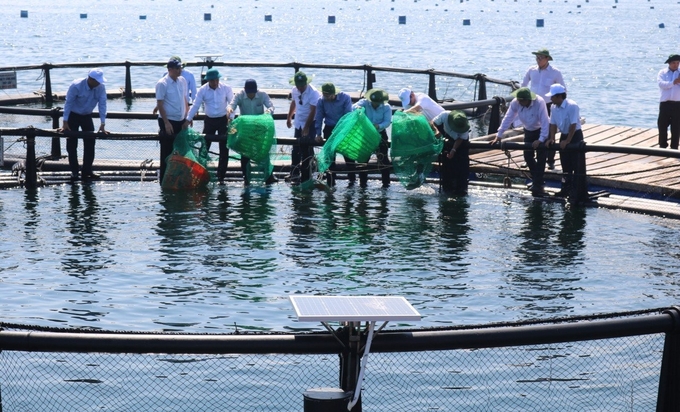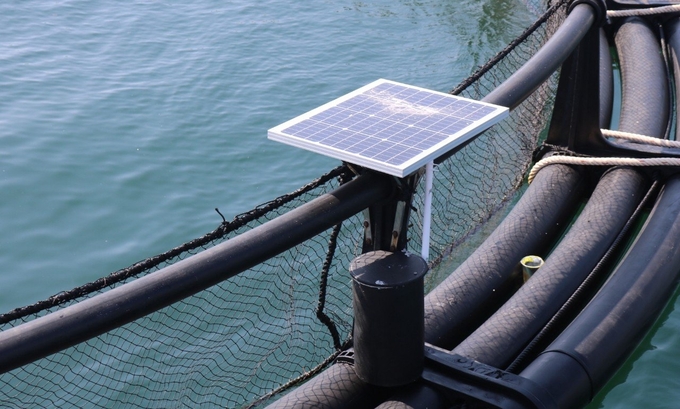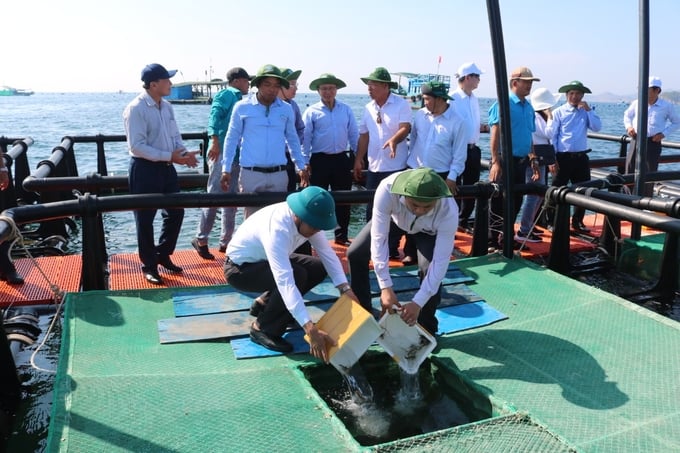November 28, 2025 | 01:23 GMT +7
November 28, 2025 | 01:23 GMT +7
Hotline: 0913.378.918
November 28, 2025 | 01:23 GMT +7
Hotline: 0913.378.918

Khanh Hoa province is focusing on developing high-tech marine farming. Photo: KS.
When converting mariculture from traditional to industrial, technological innovation is the first thing to do. Therefore, right now, Khanh Hoa province has developed an investment plan for infrastructure in concentrated farming areas, developing marine aquaculture areas in the direction of farms and industry associated with processing, applying science and technology to mariculture to ensure disease safety and improving economic efficiency.
Simultaneously, form linked aquaculture groups, move towards establishing aquaculture cooperatives at sea and link with businesses that supply and consume products to stabilize people's income.
"Our orientation on mariculture in the upcoming time is to raise key aquatic species, quickly switch to commodity production, increase the value of aquatic species per unit area, trace the origin, and ensure raw materials for processing and export industries," said Mr. Nguyen Duy Quang, Director of Khanh Hoa Department of Agriculture and Rural Development.
Phu Yen also has an investment orientation and upgrades to essential key infrastructure to meet the requirements of mariculture development associated with environmental and landscape protection. Research and apply new technology in farming, management, collection, and treatment of waste and wastewater from aquaculture and by-products associated with seafood processing to add value.

Mariculture uses HDPE cages equipped with cameras powered by solar batteries to observe the process of farming activities at sea. Photo: KS.
“In particular, we will proceed to control industrial waste sources into lagoons, bays, and beaches; Organize the collection of domestic wastewater; build a domestic wastewater collection and treatment system; limit the discharge of wastewater directly into lagoons, bays, and coastal areas; Organize trash collection activities at aquaculture rafts, lagoon areas, and along the sea," shared Mr. Nguyen Tri Phuong, Deputy Director of Phu Yen Department of Agriculture and Rural Development.
In Binh Dinh, the provincial authorities will invest in research, application, and development of new mariculture technologies to create value-added products and protect the environment. In particular, Binh Dinh will create favorable conditions for domestic and international investors to support the transfer of commercial farming technology, disease prevention and treatment, and measures to adapt to climate change for suitable mariculture species for the natural conditions of the province; Training human resources to serve management, research and production for mariculture.
“We will form a high-quality concentrated seed production area and species conservation. Diversifying mariculture objects, many mariculture objects with high economic value have the technology to proactively produce artificial seeds such as Cobia, American red snapper, sea bream, yellowfin pompano, grouper; Pacific oysters, geoduck; seaweed, grape seaweed and lobster," said Mr. Tran Van Phuc, Director of Binh Dinh Department of Agriculture and Rural Development.
Regarding technological solutions, according to experts, Vietnam's mariculture profession has two technical approaches. The first is to build its technological process, transferred from previous models in the country; The second is technology transfer from abroad. This is an area that the functional sector has not adequately organized. In the past, farmers kept learning from each other, learned from experience and then organized farming.
Technology transfer in mariculture currently has many limitations, especially technology transfer from foreign countries or foreign mariculture investors. Vietnam's mariculture profession has been developing for 10-20 years but has not been able to transfer technology to farmers, which is a significant shortcoming in policy and implementation.

Lobster stocking activities in HDPE cages in open waters in Khanh Hoa province. Photo: KS.
According to Associate Professor Dr. Vo Van Nha, Deputy Director of the Research Institute for Aquaculture No3, currently, the technology serving mariculture is quite diverse; the problem we need to solve is quality artificially produced breeds; Use industrial feed, provide automatic feed; Organic mariculture technology, using biological products in disease prevention and treatment, to ensure food safety and hygiene; improving mariculture materials, facilities, and tools; mechanization of harvesting, preservation, and processing; Using information technology, remote sensing, etc. helps reduce labor, optimize input costs, etc. These things need to be done when converting mariculture from traditional to industrial.
“Industrial mariculture needs better and different scientific and technological solutions than traditional mariculture; must reduce labor, increase animal survival rate, and be more economical. To do that, it is necessary to produce quality, fast-growing, disease-resistant breeds; Using industrial feed, automatic supply, monitoring the environment and livestock through camera systems, automatic monitoring sensors, using new materials in cage design", Associate Professor Dr. Vo Van Nha, Deputy Director of the Research Institute for Aquaculture No3, shared.
Translated by Tuan Huy

(VAN) According to Mr. Vo Minh Thanh, Director of the Tay Ninh Department of Agriculture and Environment, Resolution 57 has created a new development pathway for the locality, shifting from traditional toward modern agriculture.
/2025/11/26/4909-2-154329_878.jpg)
(VAN) Pearl grouper farming in HDPE cages not only delivers economic efficiency but also contributes to protecting the environment, creating jobs, and promoting marine-based experiential tourism.

(VAN) The model of making a living under the forest canopy through the agroforestry system in Van Son commune, Bac Ninh province, is expected to generate an annual income of approximately VND 30 million/ha.

(VAN) Many enterprises in Can Tho are harnessing natural energy and reducing greenhouse gas emissions in their production processes, thereby contributing to the promotion of a sustainable green transition.
/2025/11/24/3536-2-112800_176.jpg)
(VAN) Dong Nai now has tens of thousands of hectares of forests certified for sustainable management, and this area will continue to be expanded in the coming period.

(VAN) Vinh Ha hamlet (Dai Xuyen commune, Hanoi) is shifting away from small-scale farming as households adopt bioscurity into their breeder chicken models.

(VAN) Heavy rains make aquatic species more vulnerable to disease. Proactive water management and high-tech systems help farmers prevent outbreaks and protect yields.